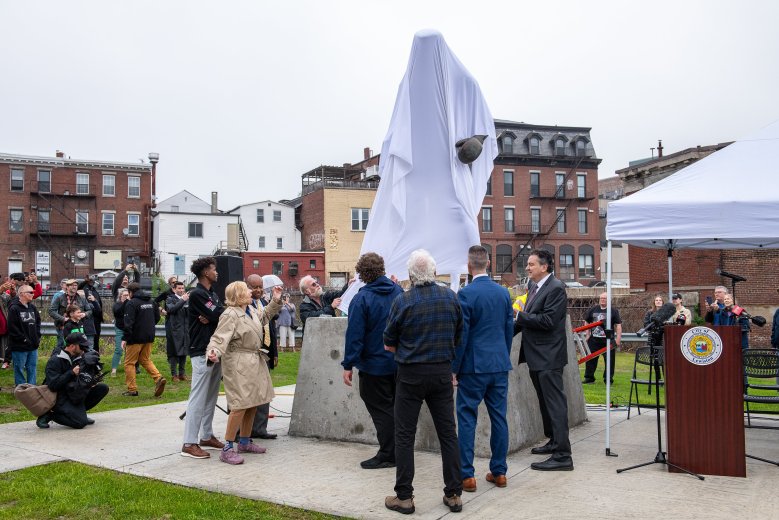
LEWISTON — Muhammad Ali once said, “Inside of a ring or out, ain’t nothing wrong with going down. It’s staying down that’s wrong.”
The first boxer to win the world heavyweight title three times and 1999 Sports Illustrated Sportsman of the Century did not go down often. Fittingly, a bronze statue in his likeness now towers 10-feet tall in downtown Lewiston, a fusion of Lewiston’s culture and history and Ali’s resilient spirit.
On Saturday afternoon, a large crowd gathered undeterred by rainy weather to watch the statue’s unveiling after it had been installed Friday.
“Muhammad Ali was not only a champion in the ring, he was also a global force for justice, for dignity and for peace,” said City Administrator Bryan Kaenrath. “His life reminds us that greatness isn’t measured simply by titles, but by our convictions, our beliefs and the impact that we can make,”
The statue recalls one of the most famous matches in boxing history — Ali’s 1965 title defense against Sonny Liston in Lewiston on May 25, 1965. The fight took place in the Central Maine Youth Center, now called the Colisée. Ali won by knockout in the first round.
Lewiston resident John Michael recalled the match, having attended as a “round card boy” who sat in the penalty box. He described the statue as “a wonderful idea,” and “beautiful.”
Tom Platz, a developer and principal at Platz Associates who also attended the famed fight, commissioned Philadelphia-based sculptor Zenos Frudakis, who has spent over 50 years creating bronze portraits and monuments. His research on Ali included Ali’s boxing attire, right down to the shoes and gloves he wore in the fight that night.

Although based on the moment memorialized by Neil Leifer’s photo of Ali standing over Liston after the knockout, the statue is uniquely Lewiston. Evoking the moment that night in 1965, the Ali’s pose takes a difference stance than in the iconic photo, becoming a ‘timeless’ icon for the city’s grit, passion and pride. Co-initiator and artist Charlie Hewitt described the statue as “unique, like Lewiston is unique.” The piece is the first full-body bronze statue of Muhammad Ali in the United States.
Together, Hewitt, Platz and Frudakis brought the statue to life over 10 years with the support of many local businesses.
According to Frudakis, the sculpture reflects the strength and moral courage of Ali, who was both boxer and social activist with a gift for spoken word poetry. A furrowed brow and defined musculature bring the famous knockout to life, staring down citygoers with the power and courage of a champion.
“He never stopped fighting for his title, for his beliefs and for his place in history,” said Mayor Carl Sheline. “Lewiston understands that spirit. Our people have faced mill closures, economic challenges and national spotlights, but like Ali, we respond not by retreating, but with resolve.”
The statue overlooks Bates Mill No. 5 at 65 Main St., just 200 feet from the Auburn bridge. It is positioned near the city’s “Hopeful” sign by artist Charlie Hewitt, who co-initiated the statue project with Platz. It represents the “loud, proud, strong, resilient” spirit of Lewiston, in the words of Gov. Janet Mills, who spoke at the unveiling.
Hewitt spoke of the importance of creating narratives. “This is the beginning of putting together the frayed fabric of our communities,” he said.
As the white cloth was pulled away, the sculpture was met with cheers and applause from the crowd. Whether in person or watching the event virtually, all who attended celebrated Ali’s boxing legacy and enduring social impact interwoven with Lewiston’s rich history and culture.
“As we unveil this statue, we don’t just honor a legend, we recognize a shared legacy, one of grit, heart and unshakable belief that where you come from doesn’t define your destiny; what you fight for does,” said Sheline.








